
Did you know that an abnormal amount of natural hair and scalp disorders are misdiagnosed each year? One of the most common misdiagnosed conditions is dandruff.
For example, often we overlook symptoms that are more accurately associated with seborrheic dermatitis, writing it off as dandruff and deciding to move forward with a self-diagnosis.
Do you remember the old Head and Shoulders commercials from yesteryear?
The premise of those commercials was very simple. Use Head and Shoulders shampoo, and you would wash away the often-embarrassing dandruff flakes. I am not bashing Head and Shoulders because I imagine that they have good products.
However, like many commercials, they play on the emotional appeal of the individual watching the commercial, which is actually good marketing.
The product appears to solve a problem that you have, so you give it a chance to live up to the claims.
Table of Contents
- 1 What is Dandruff?
- 2 Identifying Dandruff and Potential Causes
- 3 Commonly Used Hair Oils May Be Part of the Problem
- 4 What Is Eczema?
- 5 Common Myths
- 6 When is Dandruff Extreme?
- 7 Potential Causes of Dandruff-like Symptoms
- 8 Sensitivity to Certain Hair Product Ingredients
- 9 Infrequent or Inadequate Shampooing
- 10 Understanding the Impact of Dry Skin Issues
- 11 Seborrheic Dermatitis (also Seborrheic Eczema)
- 12 Eczema (Dermatitis) Skin Inflammation
- 13 The Histopathology of Psoriasis (Scaly Rash)
- 14 Malassezia (also known as Pityrosporum)
- 15 Are You at High Risk?
- 16 How To Get Dandruff Out of Curly Hair
- 17 What's the Best Hair Oil for Dandruff?
- 18 Use Anti-Dandruff Shampoos
- 19 Eczema vs. Dandruff
- 20 Natural Treatments
- 21 Using Honey as an Itchy Scalp Treatment
- 22 DIY Treatment: Home Remedies to Get Rid of Dandruff
- 23 How to Prepare the DIY Leave-On Lotion
- 24 How to Use the DIY Dandruff Treatment
- 25 What Results You Can Expect
What is Dandruff?
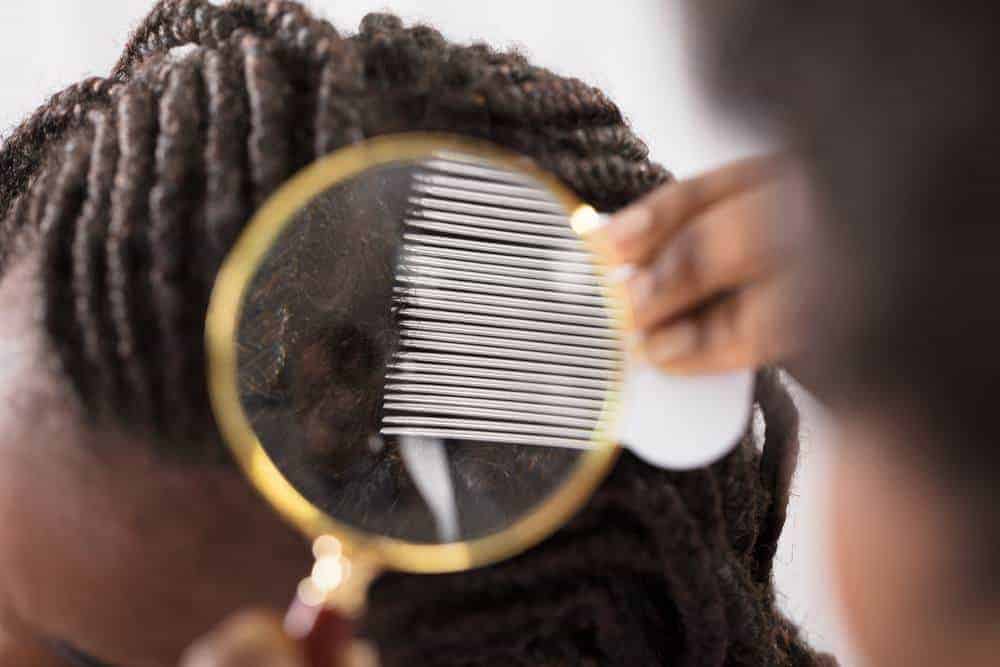
Dandruff is not contagious, and most of the time it is not a serious condition.
It is a very common scalp condition that causes the skin on your scalp to itch and flake away. In simple terms, dandruff is a scalp reaction that causes the natural cycle of skin replenishment to occur more quickly on your scalp.
Obviously, it can be embarrassing to have noticeable dandruff flakes present in your hair and on your shoulders, but typically it can be controlled.
If you only have a mild case of dandruff, you will probably be just fine by shampooing your hair regularly with a gentle sulfate-free shampoo (or a clarifying shampoo).
However, if you have a more severe case of dandruff, a board certified dermatologist or medicated shampoos, also known as anti-dandruff shampoos, may be necessary to treat dandruff.
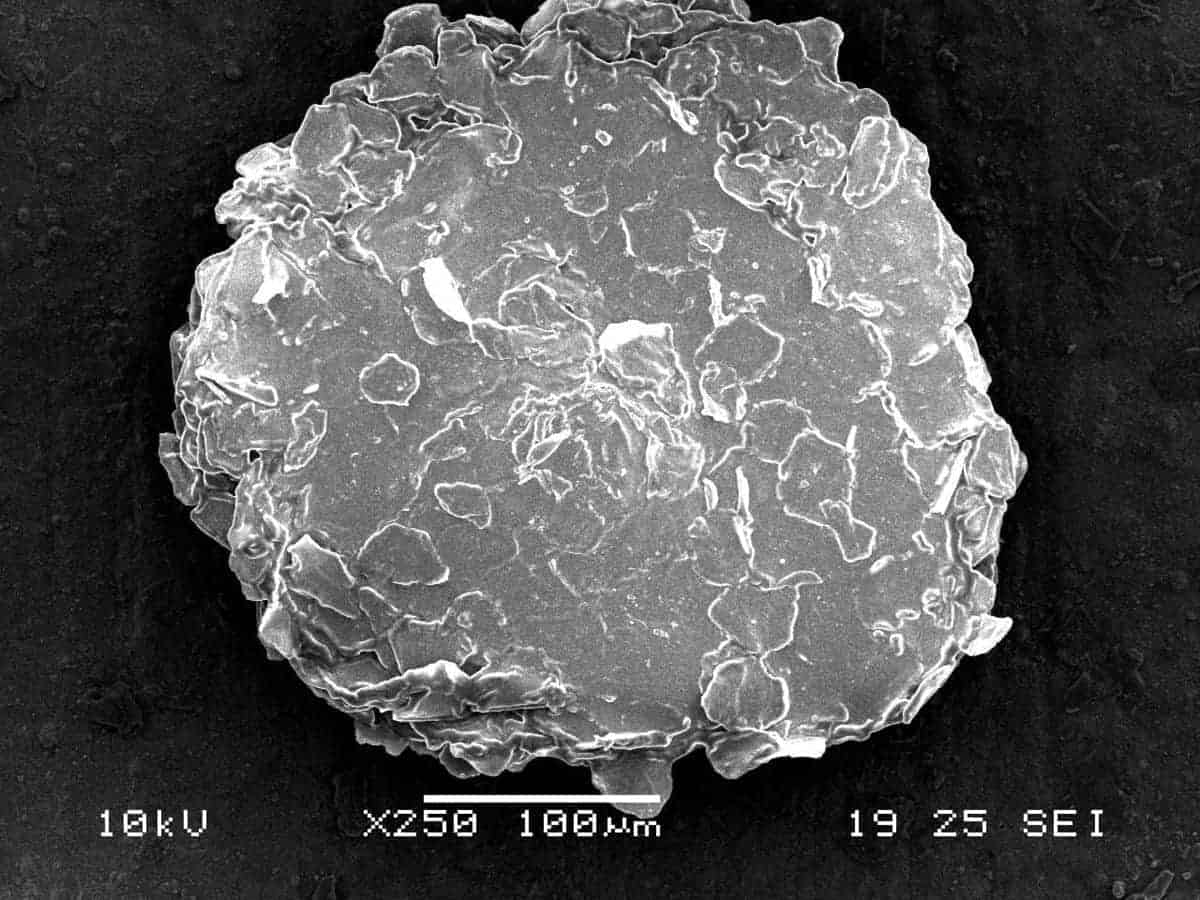
Identifying Dandruff and Potential Causes

Dandruff is a condition that is usually simple to diagnose. If there are flakes of dead skin present in your hair and on your shoulders coupled with an itchy scalp, there is a good chance that you have dandruff.
Many regular shampoo manufacturers, like Procter and Gamble, have conducted substantial scientific research to discover what causes dandruff.
Current research suggests that dandruff causes are linked to three factors: (1) fungus, (2) sebum and (3) individual susceptibility.
- Fungus: It's common for bacteria and fungi to exist on the scalp; these can grow anywhere that's warm, damp, and moist. Flaking only happens when there's more fungus than normal on the scalp. When that happens, the fungus, which is also known as Malassezia, begins to dry and fall off.
- Sebum: The aforementioned fungus, Malassezia, feeds on oleic acid, which is found in the sebum (i.e., fat) produced by the sebaceous glands on the scalp. As the fungus feeds on this fat, the composition of the sebum is significantly altered. This is what leads to individual cells losing adhesiveness. The skin flakes and falls off.
- Individual Susceptibility: While current research shows that fungus and sebum are important components, it's interesting that some people have what appears to be the perfect scenario for dandruff, yet they don't have dandruff.
Others seem to get dandruff very easily. Scientists have referred to the research as fascinating.
Commonly Used Hair Oils May Be Part of the Problem

Many commonly used hair oils, like amla oil and emu oil, contain a high concentration of oleic acid. Some people even recommend using coconut oil for dandruff, which could actually make the condition worse.
One simple solution to try is cutting off the use of these hair oils. They might make your hair look nice, but they also help feed the fungus. It's important to remember that dandruff is not the same as scalp eczema.
Both of these problems may look similar, but it's important to understand the difference to really solve your specific problem.
What Is Eczema?

Scalp eczema looks very similar to dandruff, causing dry flakes to fall from your scalp and a regular itching sensation. However, dandruff tends to be dry, white flakes of dead skin.
Eczema, by contrast, results in yellowish, slightly greasy flakes. With Eczema, the itching sensation is often coupled with inflammation. If you have eczema on other parts of your body, this increases the probability that you actually have eczema.
Common Myths
How often hair is washed has nothing to do with whether or not a person has scalp eczema or dandruff. A person with good personal hygiene skills may still have dandruff or eczema.
Once you've managed to identify the source of your flakes, it's time to figure out how to manage and treat it.
If you're concerned about having scalp eczema, or you think you might, then you should see a doctor. Severe cases of eczema and dandruff may be cause for medical intervention, even if it seems like "just" a skin problem.
The climate can also impact the condition. Fall and winter months are usually the most difficult times of the year for people with dandruff due to indoor heating contributing to dry skin and scalp issues.
Typically, statistics show that the condition will improve during the summer months.
 When is Dandruff Extreme?
When is Dandruff Extreme?
If you only have a mild case of dandruff, it is typically not necessary to visit the doctor. My advice is to find a gentle shampoo and begin shampooing your hair regularly (weekly is a good start) and adjust as needed based on the results.
However, if you're regularly shampooing your hair and it doesn’t seem to help much or if your scalp condition becomes more severe (red, tender or swollen), then it’s time to visit your medical doctor or dermatologist.
There are skin conditions like seborrheic dermatitis that resemble dandruff to the layman and should only be diagnosed by a physician or dermatologist.
This type of diagnosis generally requires a visual examination of your hair and scalp by a trained medical professional.
Potential Causes of Dandruff-like Symptoms

There are several potential causes of dandruff. Below are the most common causes:
Sensitivity to Certain Hair Product Ingredients
Experiencing sensitivity to specific ingredients within hair care products that contact the scalp (contact dermatitis) is a common cause of dandruff-like symptoms.
This is a great example of why writing down what you put in your hair is so important.
Using certain ingredients too frequently may also irritate your scalp. For example, paraphenylenediamine is an ingredient that has been known to appear in some hair care products.
It is a common culprit of itchy, scaling scalp. It’s important that you determine which hair care ingredients are causing problems for your scalp.
Infrequent or Inadequate Shampooing
Infrequent or inadequate shampooing can lead to a dirty scalp due to the potential product build-up and the accumulation of oils and skin cells on your scalp. Be sure to shampoo your hair regularly to prevent this potential cause of dandruff.
Understanding the Impact of Dry Skin Issues
Dry skin has always been a potential cause of dandruff. The problem is exacerbated in the winter months when the air outside is cold and our houses are often heated. This scenario is ripe for itchy, flaking dandruff.
It is important to note that the flakes that you will see from dry skin are usually smaller and less oily than the flakes from other causes of dandruff.
If you have dry skin on other parts of your body – like your arms, legs, and back – there is a greater probability that you will encounter this form of dandruff.
 Seborrheic Dermatitis (also Seborrheic Eczema)
Seborrheic Dermatitis (also Seborrheic Eczema)
Seborrheic dermatitis, an inflammatory skin condition, can affect oily areas of the body including your eyebrows, ears, nose, groin, armpits, and breastbone.
Additionally, this condition has been known to produce flaky, dandruff-like scales on other oily areas of your body including the scalp. Seborrheic dermatitis is commonly misdiagnosed as dandruff.
Eczema (Dermatitis) Skin Inflammation
If you have eczema on any part of your body, then there is a chance that you also have it on your scalp.
The Histopathology of Psoriasis (Scaly Rash)
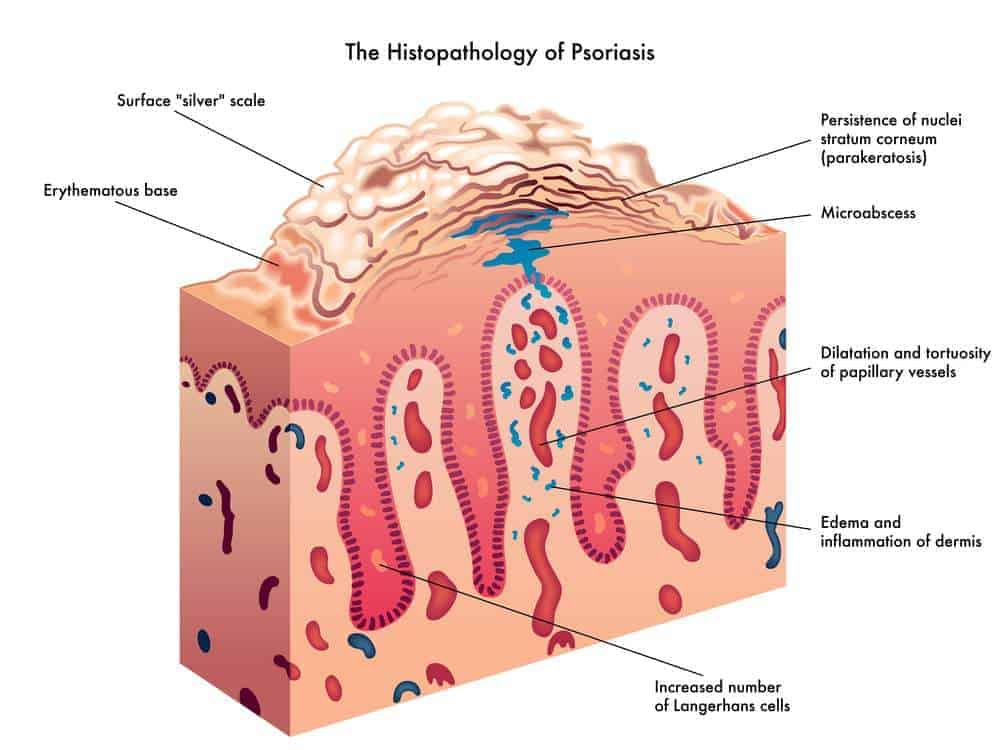
Psoriasis, which more commonly affects the knees and elbows, is a skin disorder where dead skin cells accumulate and form chunky, silvery scales.
This disorder can also affect your scalp, making it difficult to differentiate from seborrheic dermatitis without the assistance of a medical professional.
Malassezia (also known as Pityrosporum)
Malassezia (formerly known as Pityrosporum) is often found on the skin of many humans and other mammals. This yeast-like fungus typically doesn’t cause problems for most healthy adults.
However, there are times when the fungus grows out of control and feeds on the natural oils produced by your hair follicles.
This feeding process can irritate the scalp and encourage more skin to grow. When these extra skin cells die and flake away, they are generally clumped together with natural oils from your hair and scalp appearing to be dandruff to the layman.
Again, this disorder can easily be misdiagnosed as seborrheic dermatitis and obtaining professional medical advice is the recommended course of action.
Are You at High Risk?
Several factors can make you more susceptible to suffering from dandruff including:
- Males are higher risk than females due to larger oil-producing glands on their scalps.
- Individuals with oily hair and scalps are more susceptible
- Individuals who choose to eat a poor diet
- Young adults due to pubertal development through middle age
- Certain medical illnesses and conditions, which are outside of the scope of this article, also put you at high risk for dandruff. We choose not to provide medical advice and encourage you to consult with your medical doctor or dermatologist.
How To Get Dandruff Out of Curly Hair
Typically, dandruff can be controlled with a little patience and persistence. Begin by washing your hair regularly with a gentle shampoo.
Keep in mind that shampoos can contain very different ingredients and you may have to try a few to find the one that works best for you. Discontinue using any hair products that cause your scalp to itch, sting, burn or turn red.
Furthermore, if you think you’re having an allergic reaction to a hair product – like a rash or hives – then consult with your medical doctor or dermatologist at your earliest convenience.

What's the Best Hair Oil for Dandruff?
Many of hair oils contain oleic acid. The longer you use them, the more oil builds up on your scalp. All you're doing at that point is feeding the fungus and potentially making the problem much worse.
For example, we don't recommend using coconut oil for dandruff, although if you're committed to using a hair oil, the best hair oil for dandruff is either neem oil, sunflower oil, or tea tree oil.
Use Anti-Dandruff Shampoos
If you think you have dandruff, using an anti-dandruff shampoo is your first line of defense. Most anti-dandruff shampoos are effective, and many people can fix their dandruff problem just by using the right dandruff shampoo.
Be sure to follow the instructions on the bottle, or it the product might not work as intended. Once your problem has been resolved, you may want to go back to using your regular natural hair regimen.
However, it may still be best to avoid using natural oils. If over the counter shampoos don't work, you may need a prescription-strength shampoo.
Eczema vs. Dandruff
Anti-dandruff shampoos can work for some people with eczema. However, not everyone will respond favorably. If you don't see any results from an over the counter shampoo, talk to your doctor about eczema management.
They'll be able to offer a number of treatment options, and you can figure out which one works for you. There are various shampoos, creams, and other prescription strength products that can help with dandruff.
There are even stronger treatments should the eczema be especially bad. This is why it's important to get eczema diagnosed by a professional.
Natural Treatments
While natural solutions sound great, there's not a lot of science confirming how well they work. Using home remedies and natural solutions is a risk. They might work; they might not.
While that's true of every product, anti-dandruff shampoos are proven to work on a large segment of the population based on clinical lab tests. Home remedies and natural solutions are usually not backed by any scientific evidence.
However, you might try experimenting with home remedies such as tea tree oil, which is thought to reduce flaking. In addition, pure neem oil could be worth trying due to having antifungal properties.
Using Honey as an Itchy Scalp Treatment
Some recent research addressing dandruff provided some interesting information about how honey may help treat an itchy scalp.
As part of the study, the scientist looked into the possibility of using crude honey in a topical fashion in an effort to control seborrheic dermatitis as well as dandruff.
Included in the study were thirty individuals suffering from chronic seborrheic dermatitis on the scalp, chest, and face.
Ten of these patients were females, and the remaining twenty were males. The ages of the participants were between 15 and 60 years old.
All of the patients were experiencing itching, scaling and hair loss.
The subjects were instructed to apply a mixture of crude honey diluted with warm water to the affected patches. This crude honey was allowed to sit for three hours prior to a warm water rinse.
The honey had a positive effect on every patient. Within just one week, scaling was eliminated and itching ceased.
Within two weeks, skin lesions resolved. Hair loss was slowed in many patients, and none of the study participants who received weekly honey treatments for a six-month period had a relapse.
The antifungal, antioxidant and antibacterial properties of honey are well known, along with its impressive nutrients.
Given the outcome of the study, it does not seem far-fetched to suggest that crude honey, when used on a periodic basis, may serve as an effective way to treat hair loss, seborrheic dermatitis (i.e., chronic skin condition with various symptoms, like an itchy scalp).
DIY Treatment: Home Remedies to Get Rid of Dandruff

Based on a research study conducted in Thailand, a sample pool of 274 men and women were selected to test the effectiveness of a potential dandruff home remedy.
Instead of applying an anti-fungal solution to the scalp, which is one of the most widely used dandruff treatments in the world, the researchers decided to treat the loss of scalp hydration.
It's important to note that most commercial shampoos include an anti-fungal solution, so this was indeed an interesting study.
The study tested treating the problem with a humectant, which is a chemical that absorbs water out of other surfaces, to tackle the loss of scalp hydration symptom.
Though it may seem as if you are treating the symptoms, instead of the cause, the research proves that the DIY treatment is indeed effective.
The study participants who used the DIY treatment regularly for eight weeks were asked to stop using the treatment to determine if the problem would return.
The study participants confirmed that there were no signs of dandruff one week after they stopped using the DIY treatment.
How to Prepare the DIY Leave-On Lotion
Ingredients:
- Vegetable Glycerine - 10 ml
- A base of your choice (details below) - 90 ml
For the base of the solution, you can choose to use either water or your favorite leave-in conditioner. If you decide to use a water base, you could add one small drop of your favorite oil.
We like to use sunflower oil (used in the study mentioned above), but you could conceivably use argan oil, castor oil, rosemary oil, lanolin oil, tea tree oil, olive oil, jojoba oil, or your favorite essential oil.
Just be sure only to use a small drop mixing your water-based solution. Remember that hair oils can feed the fungus causing dandruff, use this treatment sparingly.
If you intend to use a leave-in conditioner as the base, you should avoid leave-ins which have a high percentage of oil content in them; be careful with natural oils too.
How to Use the DIY Dandruff Treatment
- Step 1: Shampoo your hair using your regular routine.
- Step 2: Apply the DIY Glycerin Treatment directly to your scalp.
- Step 3: Repeat the process daily (or at least four times weekly)
Note: Remember to shake the bottle containing the lotion before use to make sure the base and glycerin are mixed well.
- How Often Should You Wash Thick Hair
- Castor Oil Curl Care
- Does Wearing a Hat Cause Dandruff?
- ACV Rinse Dandruff
What Results You Can Expect
Most users report a noticeable improvement in the scaly, flaky, dry skin problem within the first two weeks of applying the DIY treatment regularly.

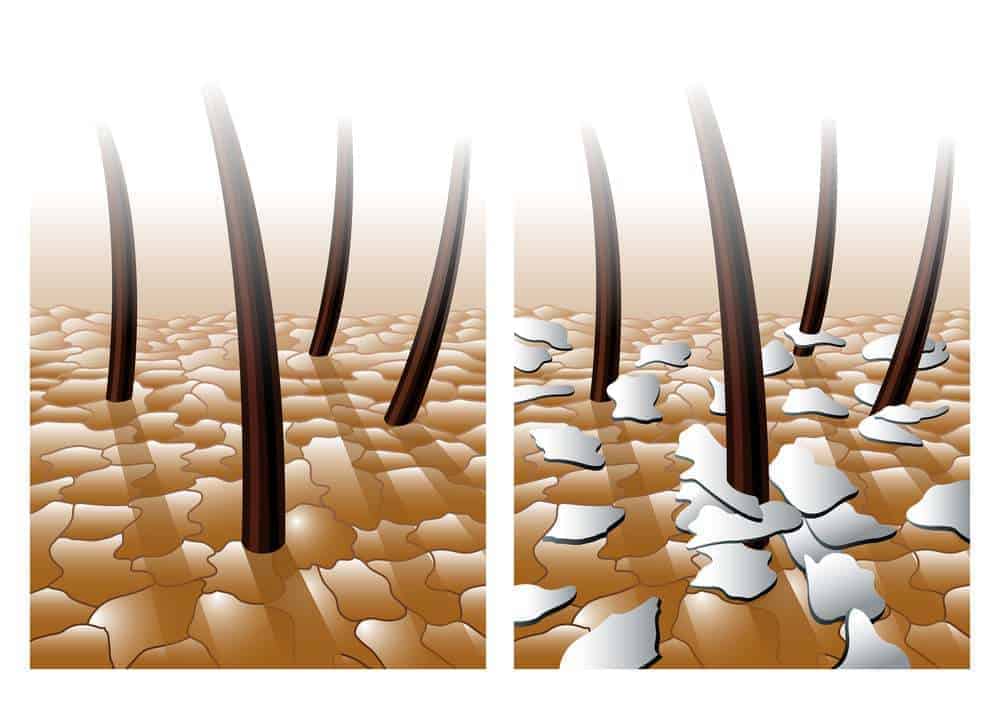 When is Dandruff Extreme?
When is Dandruff Extreme?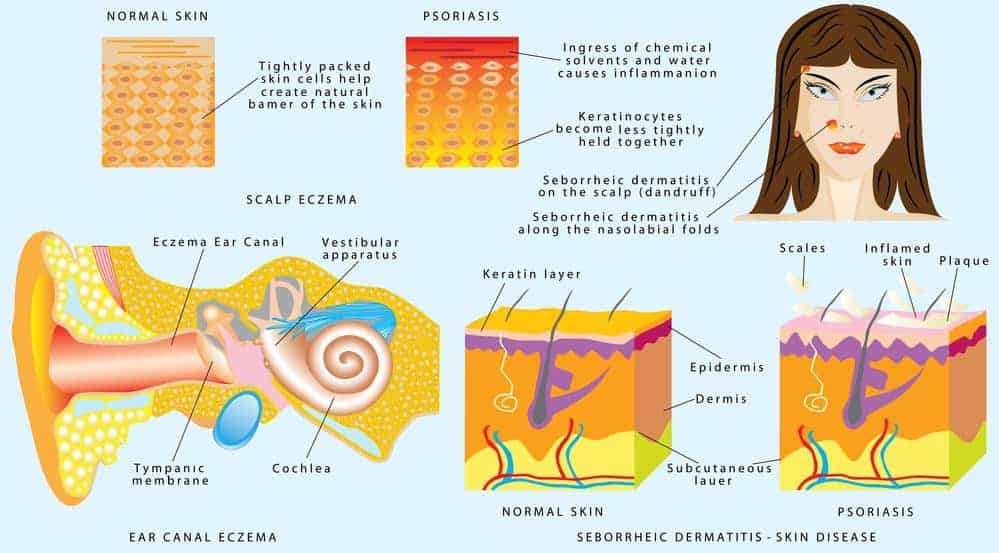 Seborrheic Dermatitis (also Seborrheic Eczema)
Seborrheic Dermatitis (also Seborrheic Eczema)


